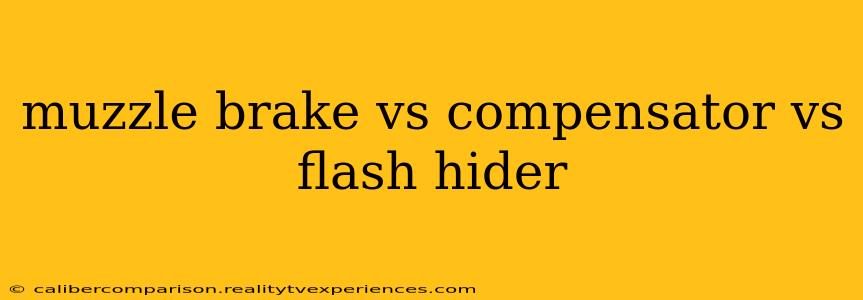Choosing the right muzzle device for your firearm can significantly impact your shooting experience. While they might look similar at first glance, muzzle brakes, compensators, and flash hiders serve distinct purposes. Understanding these differences is crucial for optimizing accuracy, recoil management, and overall performance. This detailed guide will dissect the functionalities, benefits, and drawbacks of each device, helping you make an informed decision.
What is a Muzzle Device?
Before we delve into the specifics, let's define what a muzzle device is. Essentially, it's any attachment fitted to the end of a firearm's barrel. These devices alter the path and characteristics of the gases expelled after a shot, influencing several aspects of shooting. The three primary types – muzzle brakes, compensators, and flash hiders – each achieve this manipulation in different ways.
Muzzle Brake: Taming Recoil
A muzzle brake is designed primarily to reduce felt recoil. It achieves this by venting propellant gases to the sides and/or upwards, creating a counter-force that pushes against the recoil impulse. This results in a noticeably smoother shooting experience, especially beneficial for high-caliber rifles and those with less recoil tolerance.
Advantages of a Muzzle Brake:
- Significant Recoil Reduction: The primary advantage is a substantial decrease in felt recoil, leading to faster follow-up shots and improved accuracy.
- Improved Controllability: Reduced recoil translates to better control, particularly during rapid firing.
Disadvantages of a Muzzle Brake:
- Increased Noise and Blast: The venting of gases to the sides creates a louder report and potentially more blast, impacting the shooter and those nearby.
- Increased Muzzle Rise (in some designs): While designed to reduce recoil, some muzzle brake designs can inadvertently increase muzzle rise, depending on their specific gas venting configuration.
- Potential for Discomfort: The side blast can be uncomfortable for the shooter and those nearby, even potentially causing hearing damage with prolonged exposure.
Compensator: Enhancing Accuracy
A compensator shares similarities with a muzzle brake, but its primary focus is to reduce muzzle rise and improve overall accuracy. It accomplishes this by directing propellant gases upwards, counteracting the rotational force that causes the muzzle to climb after firing.
Advantages of a Compensator:
- Reduced Muzzle Rise: The most significant advantage is a reduction in muzzle rise, enabling faster target reacquisition and more consistent shot placement.
- Improved Accuracy: By mitigating muzzle climb, a compensator contributes to improved accuracy, particularly in rapid-fire situations.
Disadvantages of a Compensator:
- Less Recoil Reduction (compared to a muzzle brake): While it does reduce recoil to some degree, the recoil reduction is generally less pronounced than with a muzzle brake.
- Potential for Increased Noise (less than a muzzle brake): While it might reduce the blast slightly, the overall noise level can still be increased compared to an unsuppressed barrel.
Flash Hider: Minimizing Visibility
A flash hider is primarily concerned with minimizing the muzzle flash produced during firing. It achieves this by directing and breaking up the escaping propellant gases, reducing the visible flame. This is particularly valuable in tactical or nighttime shooting scenarios.
Advantages of a Flash Hider:
- Reduced Muzzle Flash: The main benefit is a significant reduction in muzzle flash, enhancing concealment and reducing the shooter's visibility.
- Improved Night Vision: Reduced flash improves the shooter’s ability to use night vision devices effectively.
Disadvantages of a Flash Hider:
- Minimal Recoil or Muzzle Rise Reduction: Flash hiders offer little to no recoil reduction or muzzle rise control.
- May Still Produce Some Flash: Depending on the design and ammunition, some muzzle flash might still be visible.
Choosing the Right Muzzle Device
The choice between a muzzle brake, compensator, and flash hider depends entirely on your individual needs and priorities.
- Prioritize recoil reduction? Choose a muzzle brake.
- Focus on accuracy and managing muzzle rise? Select a compensator.
- Concerned about muzzle flash? Opt for a flash hider.
Some high-end devices even offer a hybrid design, combining features of multiple types. Always consult with a firearms professional to determine the best muzzle device for your specific firearm and shooting style. Improper installation or selection can negatively impact performance and potentially cause damage to the firearm.

